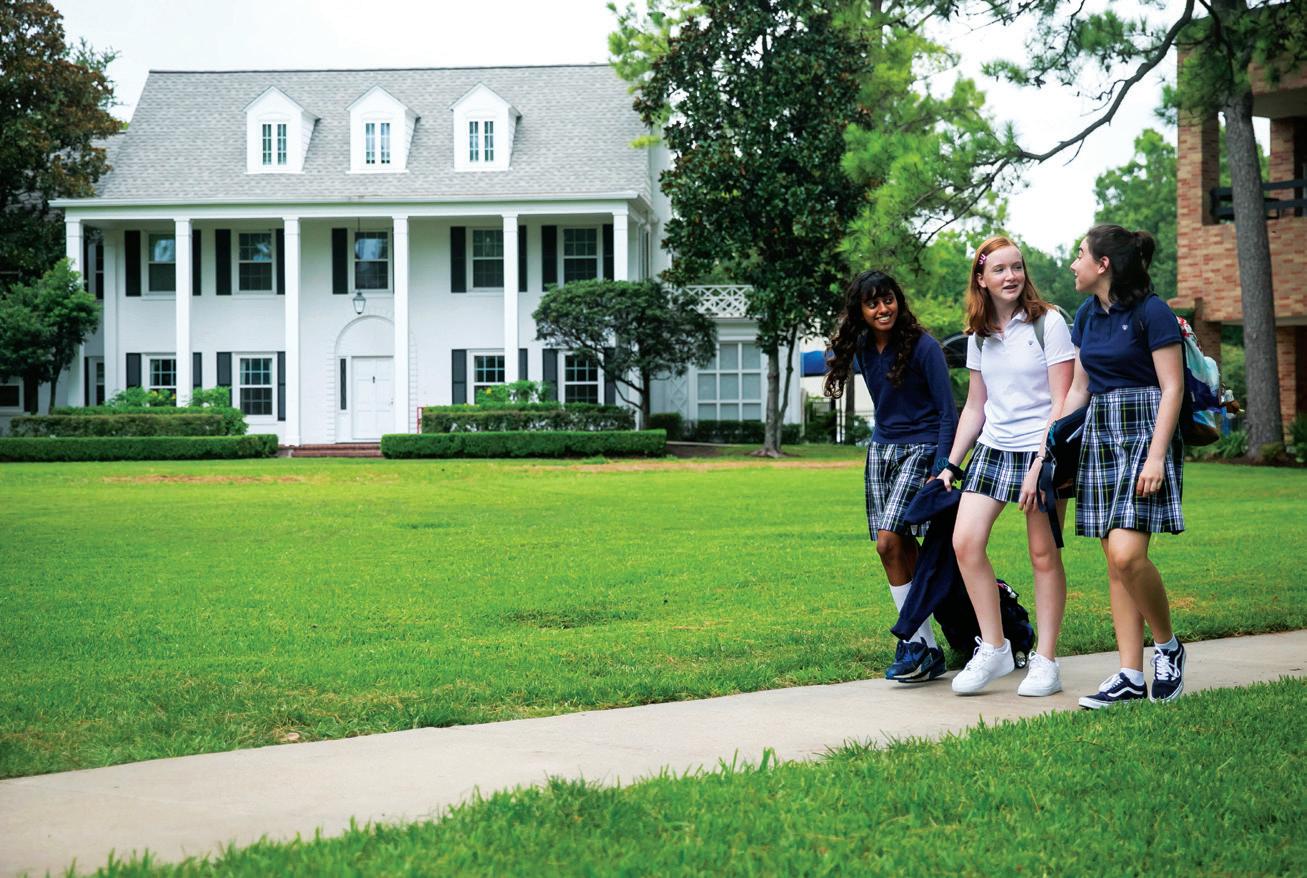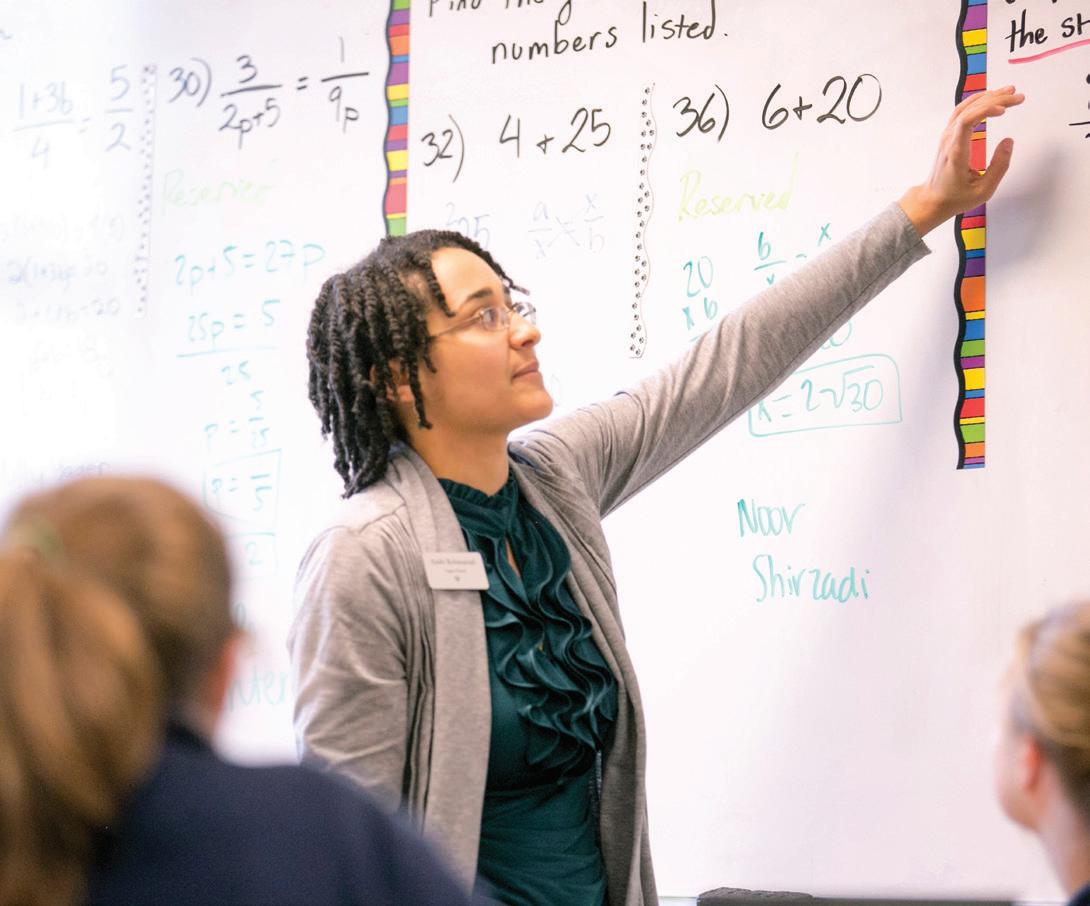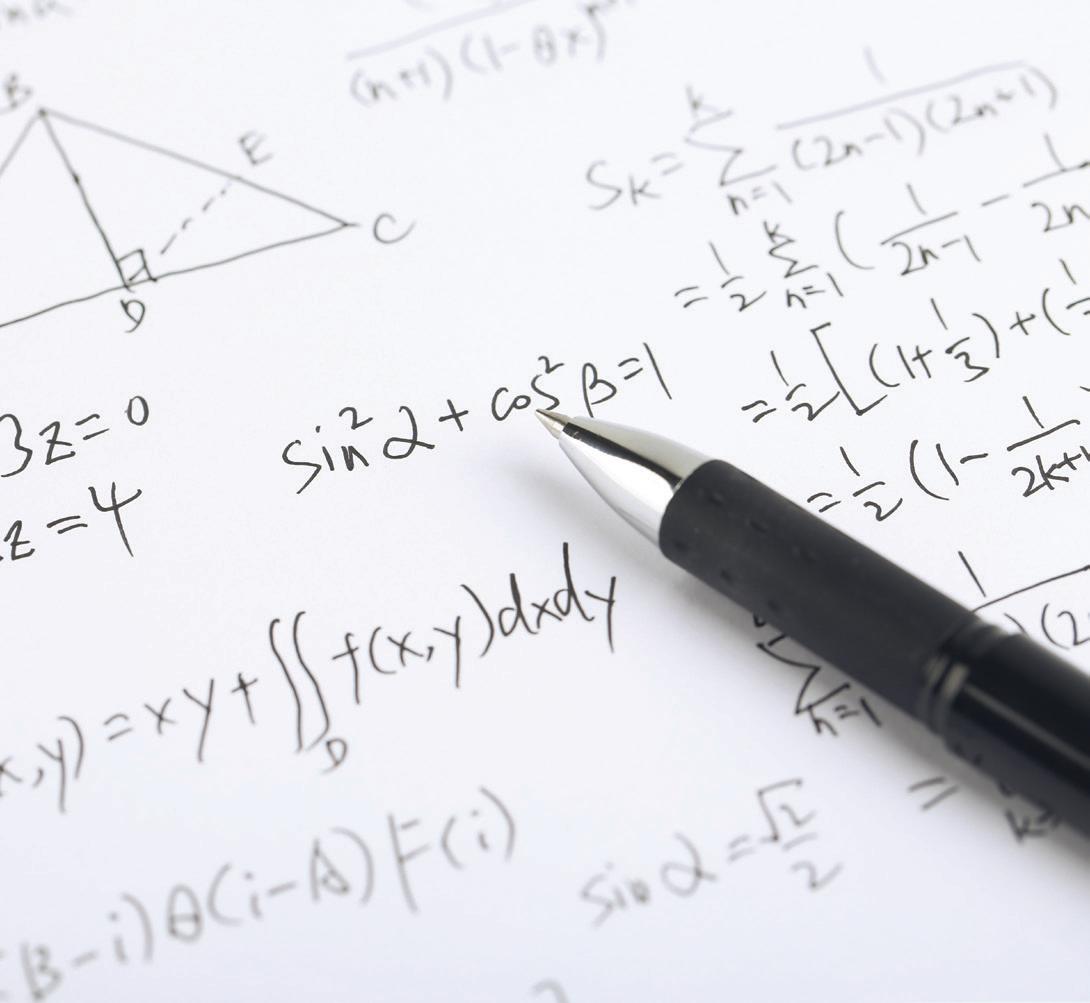
17 minute read
COURSE DESCRIPTIONS
English
The American Dream
Advertisement
The American Dream is a powerful part of our country's mythology. The promise of a better life inspires people to work hard and to achieve greater things. But what exactly is The American Dream? Is it a guaranteed feature of our "land of opportunity," which is founded upon "life, liberty, and the pursuit of happiness"? Or is it simply an illusion with no connection to reality? This course examines how The American Dream has shaped our country and considers how—or whether—we should believe in the dream today. In addition to visual imagery and poetry, we’ll read F. Scott Fitzgerald's The Great Gatsby. Prerequisite: none Grade Level: 11th Offered: 2B, 2C Length: 1 Bin
Rhetoric: Language & Persuasion
Language can be powerful. It can express incredible ideas, change the way people think, and persuade masses of people to do things. In this course, we’ll examine literature, speeches, and media and analyze how they influence their audiences. For example, how did Martin Luther King persuade his audience to continue to have hope, despite the discrimination they faced? And why do we feel “patriotic” when we listen to the national anthem? It’s due in part to the way the writers used language effectively. We’ll also look at everyday situations to consider how messages influence us. For instance, how does a pop-up ad convince us to prefer one brand of shoes over another one? Once you learn the strategies, you can use them to persuade your own audiences. Prerequisite: The American Dream Grade Level: 11th Offered: 4C, 4D Length: 1 Bin
Civil Disobedience
Novelist and journalist Anna Quindlen called America “an improbable idea” because it’s a nation of vast differences “held together by a notion” of equality. The differences threaten to pull us apart, but our core beliefs somehow manage to keep us together. This course will focus on the vast differences and on those American writers bold enough to express them. The pieces we’ll read will make us think about our own era’s culture and expectations, and most importantly, they’ll demand that we think for ourselves rather than simply doing what others tell us to do. Readings are taken from the 19th and 20th century, starting with Thoreau’s famous “Civil Disobedience” essay. Other authors include Hawthorne, Whitman, Frederick Douglass, and Kate Chopin. Prerequisite: Rhetoric: Language & Persuasion Grade Level: 11th Offered: 4A, 6A Length: 1 Bin
Required for all seniors not in AP: Writing for Change
English class is more than just literary analysis. In this course, students will identify a problem in their local, regional, national, or global community and find a means to educate people about that problem and propose possible solutions. Besides writing traditional papers, students will educate and inspire change in a variety of media including videos or podcasts. With college around the corner, students will ultimately have to confront where they fit within the world and how they want to impact that world. They will choose how they want to live Goal III: “A social awareness which impels to action.” Prerequisite: none Grade Level: 12th Offered: 1A, 2B Length: 1 Bin
Seniors not taking AP must choose two of the following courses on pages 8-9:
The Book Was Better
This course covers seminal works of Western Literature and explores their resonance in today’s globalized and technologically changing world. Texts include canonical works, such as A Study in Scarlet, coupled with more modern works, such as The Namesake, Jurassic Park, or The Handmaid’s Tale. Students will investigate the importance and the impact of selected readings, analyzing film or television adaptations and how performed texts differ from the written word. Is the series Sherlock retelling Arthur Conan Doyle’s stories or creating something totally new? For that matter, what makes Doyle’s novels and short stories so remarkable? In this class, students will debate such questions and consider what is gained and lost in the afterlives of great texts. Prerequisite: Writing for Change Grade Level: 12th Offered: 2C, 2D Length: 1 Bin
The Luck of the Irish
“Irish eyes are smiling” as we discuss the works of some of the greatest Irish poets and novelists. Students will explore the wacky genius of James Joyce (focusing on some of the short stories in Dubliners), the imaginative poetry of W.B. Yeats, the hilarity of Oscar Wilde (particularly The Importance of Being Earnest), and the lyrical majesty of Seamus Heaney. We will end the course with students picking a novel to study from a contemporary Irish author (suggestions include Sally Rooney, Colum McCann, or Tana French). Prerequisite: Writing for Change Grade Level: 12th Offered: 6A Length: 1 Bin
Indiana Jones and the Epic Bin
An exceptional hero, encounters with monsters, and a trip to the underworld are all features of traditional epics (including The Odyssey, The Aeneid, Paradise Lost), but they are also the features of the iconic 1980s Indiana Jones film series. Using Raiders of the Lost Ark, Indiana Jones and the Temple of Doom, and Indiana Jones and the Last Crusade as core texts and supplementing with readings from traditional epics, students will explore the style of an epic narrative and make critical arguments about the longevity of the genre. Students will ultimately explore why the epic genre continues today and why a form once so popular in oral and later written tradition has now become more synonymous with film. And then, of course, there’s another question to answer: “Snakes. Why did it have to be snakes?” Prerequisite: Writing for Change Grade Level: 12th Offered: 4D Length: 1 Bin
In her poem, “Still I Rise,” Maya Angelou powerfully captures her worth in a country that tries to devalue and oppress her: “You may shoot me with your words, / You may cut me with your eyes, / You may kill me with your hatefulness, / But still, like air, I’ll rise.” Starting with this poem and the poetry of Claudia Rankine, we will explore some of the rich literature (poetry and novels) from prominent Black American women writers. Together as a class we’ll analyze and discuss a novel from Toni Morrison or Zora Neale Hurston, and then students will have the opportunity to work in small groups on books by Jesmyn Ward, Austin Channing Brown, Alice Walker, or Brit Bennett. Prerequisite: Writing for Change Grade Level: 12th Offered: 5A Length: 1 Bin
Shakespeare’s Friends (and Enemies)
In the 1623 First Folio of Shakespeare’s works, contemporary playwright Ben Jonson wrote, “Reader, look not on his picture, but his book.” Although unkind about Shakespeare’s face, Jonson clearly respected the talent of his friend Shakespeare as he urged readers to read the plays of one of the greatest writers of all time. Because of the focus placed on Shakespeare, however, we often miss the talent of Shakespeare’s friends (and enemies), not only Jonson (probably even better at writing comedy than Shakespeare), but also Thomas Kyd, Christopher Marlowe, and John Webster. This course invites students to explore these other Renaissance writers, considering plays as varied as The Alchemist (Jonson), The Spanish Tragedy (Kyd), Tamburlaine (Marlowe), and The Duchess of Malfi (Webster) as well as reading poetry from the time period. Prerequisite: Writing for Change Grade Level: 12th Offered: 3B, 4B Length: 1 Bin
Keep It Short: Short Stories
What must an author do in a short story that is different from a novel? How do you develop a character in 40 pages, 20 pages, 10 pages, or even fewer? How do you capture a setting in a few lines or paragraphs? In this course, students will explore short stories from writers like Jhumpa Lahiri, Ernest Hemingway, Eudora Welty, James Baldwin, Shirley Jackson, Nathaniel Hawthorne, Franz Kafka, and Gabriel Garcia Marquez. After reading these model texts, students will try writing their own stories. Prerequisite: Writing for Change Grade Level: 12th Offered: 6B Length: 1 Bin
English


AP COURSES AP English Language and Composition
AP English Language combines a survey of American Literature and a systematic preparation for the Advanced Placement English Language and Composition Exam. In this course, students learn to read complex texts analytically and to construct effective arguments efficiently. Readings range from classic American texts to contemporary pieces, with a focus on persuasive prose. Students will also study two short American classics: The Scarlet Letter and The Great Gatsby. Part 1 focuses on the AP rhetorical analysis and argument essays and multiple-choice questions. Part 2 introduces the AP synthesis essay. Part 3 reviews all AP essay types, along with the multiple-choice questions. Prerequisite: none Grade Level: 11th Offered: 1B-3C-5D, 1D-3A-5B Length: 3 Bins
AP Literature: Studies in Africa
Exploring the wealth of literature coming from and about Africa, students will be introduced to the fundamental ideas of AP English Literature: character, setting, structure, narration, and figurative language. We will explore how American and European authors have written about Africa (Barbara Kingsolver’s Poisonwood Bible and Joseph Conrad’s Heart of Darkness) and how African authors like Chinua Achebe (Things Fall Apart) have responded. We will consider the portrayal of African women in the works of Chimamanda Ngozi Adichie (Purple Hibiscus) and Yaa Gyasi (Homegoing). We will conclude with the recent film portrayal of Africa in Black Panther. This course will satisfy one bin of AP English Literature and Composition. Grade Level: 12th Offered: 1B, 1D Length: 1 Bin
“To be or not to be. That is the question.” Shakespeare’s most famous line captures Hamlet at a particularly low point; should he revenge his father’s death if it means he must kill his own uncle and his king? In asking “To be or not to be,” Hamlet asks, “What’s the point?” – not just the point of his revenge, but also, even more significantly, of his life. This course will tackle Hamlet, one of Shakespeare’s greatest dramas and one of the greatest pieces of literature. As we explore Hamlet’s complicated and emotional journey, we will ask essential questions about “the meaning of life.” After studying Hamlet, students will work on some contemporary metaphysical poetry and Shakespeare’s sonnets. This course will satisfy one bin of AP English Literature and Composition. Prerequisite: AP Literature: Studies in Africa Grade Level: 12th Offered: 3A, 3C Length: 1 Bin
AP Literature: Blockbusters
What makes a novel, a play, or a movie popular? Students will read and watch a variety of “blockbusters” to analyze how characters, narrators, settings, or language have spoken to their contemporary audiences but have also resonated with later audiences. This course not only asks students to consider what defines viewers or readers, but also what defines the texts themselves. Why was The Spanish Tragedy by Thomas Kyd the third most performed play during the English Renaissance, far surpassing the performances of his fellow playwright William Shakespeare? Why did Tim Burton’s 1989 Batman smash box office records and usher in a new era of superhero movies (a genre still thriving more than 30 years later)? Why have Lord of the Rings and Harry Potter each sold more than 100 million copies? This course will satisfy one bin of AP English Literature and Composition. Prerequisite: AP Literature: Shakespeare and the Meaning of Life Grade Level: 12th Offered: 5B, 5D Length: 1 Bin
ELECTIVE COURSES Literature of the Holocaust
This course will look at 3 iconic works of the Holocaust: Night by Elie Wiesel, Man’s Search for Meaning by Victor Frankel, and The Periodic Table by Primo Levi. Class discussion will be a major driver of this course and students will have the opportunity to pick a relevant topic, research it, and present it to the group. Grade Level: 12th Offered: 2A Length: 1 Bin
College Essays and Convos
Common app essays, supplemental essays, personal statements. . . College admissions can be stressful for anyone, and this course will help you navigate through the process. Taken during junior year, this course will provide practical tips to writing your essays and providing colleges with a complete picture of you beyond your transcript. By the end of the course, students should have several skills to tackle their essays efficiently and effectively. Grade Level: 11th Offered: 1D, 4B Length: 1 Bin
SAT/ACT Prep
SAT, ACT, IDK!! College admissions testing is confusing, but it doesn’t have to be. Once you know which test to take and how to approach it, you’ll be able to enter the testing room with confidence. In this course, you’ll get an overview of the SAT and ACT so you can decide which one suits you best. You’ll also learn helpful hints for taking each exam, as well as practice with questions from the different sections of the tests. You’ll also learn about the essay sections: are they really optional? This course will arm you with all the skills you need to conquer the test. You’ll be able to relax and smile, LOL. Grade Level: 10th - 12th Offered: 2A, 4B Length: 1 Bin

Dive Into Your Imagination
Writing takes practice. To build writing stamina, it is important to write every day without restrictions. In this course, we will explore our imaginations by stream of consciousness writing. Using a variety of writing prompts, from photographs to poetry to artwork, every day will be devoted to the craft of writing and the process necessary to develop a polished piece. Grade Level: 9th - 12th Offered: 3A Length: 1 Bin
Humans of Duchesne: Community Connection Through Photo Stories
Inspired by photographer Brandon Stanton’s Humans of New York (HONY) photoblog and book, this bin will explore human interest stories in the Duchesne Academy community through photojournalism. Learn how to effectively interview a subject, ask the right questions, craft an insightful story caption, photograph the person in his or her element, and tie it all together to create a powerful personal story. Grade Level: 9th - 12th Offered: 5D Length: 1 Bin

Mathematics
CORE COURSES Algebra I
Algebra I, often defined as the language of physics where physics is the explanation of life, gives students a foundation for all future mathematics courses by emphasizing the study of multiple representations of linear and non-linear functions. Students will explore the fundamentals of algebraic problem-solving: solving equations, solving inequalities, exponents, polynomials and factoring, quadratic equations, and radical expressions and equations. Throughout the course, students will learn how to apply these concepts to real-life situations. Prerequisite: none Grade Level: 9th Offered: 1A-3B-5C, 1C-3D-4A Length: 3 Bins
Geometry
Geometry is a place for students to showcase their algebra skills through logic and spatial reasoning. Students encounter real-world scenarios and use deductive reasoning to guide them through the problem-solving process. The course includes a thorough treatment of the foundations of geometry: points, lines, and planes, properties of polygons and circles, as well as areas of figures and volumes of solids. Prerequisite: Algebra I Grade Level: 9th, 10th Offered: 2B-4C-6D, 2C-4D-6A, Length: 3 Bins 2D-5A-6B
Advanced Geometry
Students will showcase their algebra skills using logic, spatial reasoning, and problem-solving in collaborative real-world scenarios. When working through challenging problems, students will formulate a simpler problem, work backwards, and recall strategies from previous scenarios. This course includes foundations of geometry: inductive and deductive reasoning, properties of polygons and circles, and volume calculations. Prerequisite: Algebra I Grade Level: 9th, 10th Offered: 2D-5A-6B Length: 3 Bins
Algebra II
Algebra II provides a conceptual bridge for topics from Algebra I and Geometry. Some of the concepts covered will include functions, equations and inequalities, logarithmic and exponential relationships, conics, quadratic and polynomial equations, and matrices. Topics that were introduced in Algebra I will be expanded and applied to questions that require higher-order thinking skills where students will need to justify and explain their thought processes. Additional topics will be introduced through independent activities, group projects and presentations, and teacher-led discussions. Computers and graphing calculators will be used to introduce and expand upon these concepts. Prerequisite: Geometry Grade Level: 10th, 11th Offered: 1A-3B-5C, 2B-4C-6D, Length: 3 Bins 2C-4D-6A
Advanced Algebra II
The second year of Advanced Algebra focuses intensely on the study of types of numbers and functions. The goal of the course is to develop a strong numerical, algebraic, and graphical sense while building a verbal fluency of the mathematics. We will go beyond the linear and quadratic to explore radical, rational, exponential, logarithmic functions, and the topics of probability and statistics. Our analysis will include a wide range of applications from carbon-dating to space exploration. Prerequisite: Geometry Grade Level: 10th, 11th Offered: 2B-4C-6D, 2C-4D-6A Length: 3 Bins
Pre-Calculus
Pre-Calculus is designed to intertwine and deepen understanding of topics from Algebra and Geometry in preparation for further mathematical studies in Calculus. With a focus on numerical, graphical, algebraic, and verbal analysis, we will explore three main themes: Bin 1: The Function Machine: Linear, Polynomial, Radical, and Rational Functions Bin 2: Thinking in Circles: Analytical Geometry and Trigonometric Functions Bin 3: Explaining Nature with Mathematics: Exponential and Logarithmic Functions, Conic Sections, Probability Students will work collaboratively and learn via a combination of direct instruction, discovery, and project-based inquiry. Prerequisite: Algebra II Grade Level: 11th, 12th Offered: 2A-4B-6C, 1D-3A-5B Length: 3 Bins
Advanced Pre-Calculus
In Advanced Pre-Calculus, students will study the theoretical aspects of polynomial, exponential, logarithmic, and trigonometric functions, and get a sense of how these functions are lurking in the world around us. Attention is given to precise communication of mathematical ideas in proofs and written and oral explanations. Students will move easily between graphical and algebraic representations of solutions and they will be able to articulate why an answer makes sense in more than one way. Upon the completion of all three bins, students will have acquired a strong foundation for the study of AP Calculus. Prerequisite: Algebra II Grade Level: 11th, 12th Offered: 2C-4D-6A Length: 3 Bins
Calculus
To study Calculus is to study how quantities change. You have already studied the linear relationship that occurs when a quantity changes at a constant rate. In this course, you will learn how to determine instantaneous rates of change of quantities that do not vary at a constant rate. You will use technology as a primary tool for discovery of rules, properties, and theorems about the derivative and the integral. Prerequisite: Pre-Calculus Grade Level: 12th Offered: 2A-4B-6C Length: 3 Bins
AP COURSES AP Calculus: AB
The AP Calculus AB course answers the questions “How fast…?” and “How much …?” by an in-depth study of the derivative and the integral. In the process, we will study curve properties, optimization, rate of change, motion, and what it means to accumulate change. Students will work with functions represented in numerical, graphical, tabular, and algebraic forms and they will learn to connect these representations. Students will be taught to present their findings in clear verbal and written format. We will use many types of software and technology to visualize the calculus concepts. Upon completion of all three bins, students are prepared to take the AP Calculus AB exam. Prerequisite: Pre-Calculus Grade Level: 11th, 12th Offered: 1D-3A-5B Length: 3 Bins
AP Calculus: BC
AP Calculus BC covers all the topics of AB Calculus along with the addition of several topics that include sequences and series, vectors and parametrics, polar area and arc length, as well as extension of integration techniques. The major topics of derivative (rate of change) and integral (accumulation of changes) are emphasized throughout the course. As with the AB course, AP Calculus BC emphasizes not only procedures but also the reasons and understandings behind the procedures. This course pushes for connections between topics and fosters the learning of a variety of mathematical techniques with which to analyze problems with diverse contexts. Prerequisite: Pre-Calculus Grade Level: 12th Offered: 1B-3C-5D Length: 3 Bins
AP Statistics
The news and media are filled with numerical information. Have you ever wondered where the information comes from, and if it is even valid? AP Statistics is a course designed to give you a thorough understanding of random events, probability, data collection and its analysis. Each day we look at a real-world scenario and come closer to finding the truth. Does Beyoncé write her own lyrics? Can some people really smell Parkinson’s Disease? Does the store brand have as many chocolate chips as the name brand? Let’s find out! By the end of the class, you’ll be 99% confident and prepared for the AP exam. Prerequisite: Algebra II Bin 1: Collecting and Describing Data and its Distributions Bin 2: Probability, Sampling Distributions, and Statistical Inference for One Group Bin 3: Statistical Inference for Two or More Groups, and Review for the AP Exam Grade Level: 11th, 12th Offered: 1A-3B-5C Length: 3 Bins












